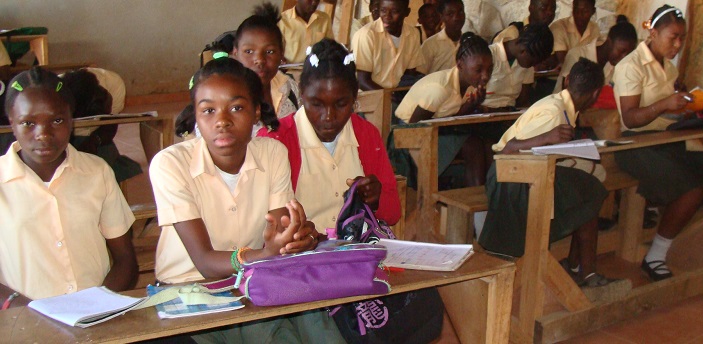Bonding over math, C&I Professor Adam Poetzel builds relationships and shares knowledge across borders
by The College of Education / May 21, 2013

Two Illinois mathematicians travel to Haiti to share learning and teaching methods with math teachers in a rural school

While most teachers in the U.S. typically have access to professional development, teachers in Haiti do not.
Knowing that, Adam Poetzel, clinical assistant professor in the Department of Curriculum and Instruction, partnered with Jay Hooper MS ’06 LAS, math department chair at Centennial High School in Champaign, to start a relationship with secondary math teachers at a rural school in the Haitian city of Gramothe.
"We hoped to be able to bond as math educators," said Poetzel, "to learn from each other's experiences and knowledge base, and begin thinking about how they can all better serve their students in learning mathematics."
Last semester, Poetzel and Hooper visited the school to meet their Haitian colleagues and to develop strategies for learning. They also updated the 17 existing computers in the school's computer lab and delivered 13 new laptops so that more students could work simultaneously. The original computer lab and the new laptops were funded through donations of time and resources from a University of Illinois registered student organization, Illini Life Christian Fellowship.
Different Approaches to Learning
To help the math teachers achieve the goals laid out by their school's director, Poetzel and Hooper suggested strategies to encourage critical thinking, problem solving, and conceptual understanding in the rural school's students.
"As we shared some strategies with the teachers by having them experience a student's perspective, it was exciting to see them really enjoy reasoning through different problems," Poetzel explained.
View photos on the College of Education Flickr.
The two Illinois mathematicians say it was fascinating to see how they and the Haitian math teachers approached math problems differently. They would eventually come to the same answer on a given problem, "but we likely solved it a very different way," Hooper said. "This served to fuel many conversations centered around teaching and mathematics. It felt like there was a mutual respect of everyone in the room."
For students in Haiti, the math curriculum covers a wide range of topics, many of which extend beyond what a typical U.S. student might learn in the classroom. Poetzel explained that most schools follow a national curriculum endorsed by the government, and he observed that this curriculum seemed to stress more systematic algebraic approaches than visual or graphical ones.
"While Jay and I tended to draw graphs and representation to help us solve problems, they tended to use primarily algebraic procedures and formulas," Poetzel said. "The teachers and students we worked with always had a very formal way of approaching problems that was consistent between them. Jay and I often utilized more informal approaches that led to the same conclusions."
Professional Development Exchange
During the trip, the learning and professional development was not limited to one side of the equation.
"One thing they taught us was about how to use the 'board' purposefully to help students have a clear understanding of a problem and its solution. All of the teachers worked systematically from left to right, in columns, working out problems. The problems were always clearly stated on the board with all variables clearly defined," Poetzel said.
The steps to each problem were often numbered and given subheadings to help clarify what was being accomplished in each step and that work for each problem was not erased until all students had copied it down in their notebooks.
"The board had a sacred feel to it," Poetzel said. "Work was not done sloppily or haphazardly. All work was done completely, precisely, and neatly. I believe part of this was that many students did not have their own textbooks, thus their notes became their tool for studying and learning outside the classroom."
The two say that the Haitian math teachers were appreciative of the professional development exchange, and at the end of the experience, they communicated that it was hard to say good bye.
"They seemed to really feel valued and validated in our discussions," Poetzel said. "As we shared strategies with one another, they were very interested in questioning strategies that allowed for more than one answer or approach from students."
Poetzel said his take-home from the experience is that professional development is not something you do "to" teachers, but something you do with them, collaboratively.
"Developing mutual trust is a critical component to teachers being open to new ideas and strategies," he said. "It was also very important that we did not enter this experience with the mindset that we were there to teach the Haitian teachers how they should teach. We all share the same goals as math teachers, and all bring a lot of knowledge and experience to the table."